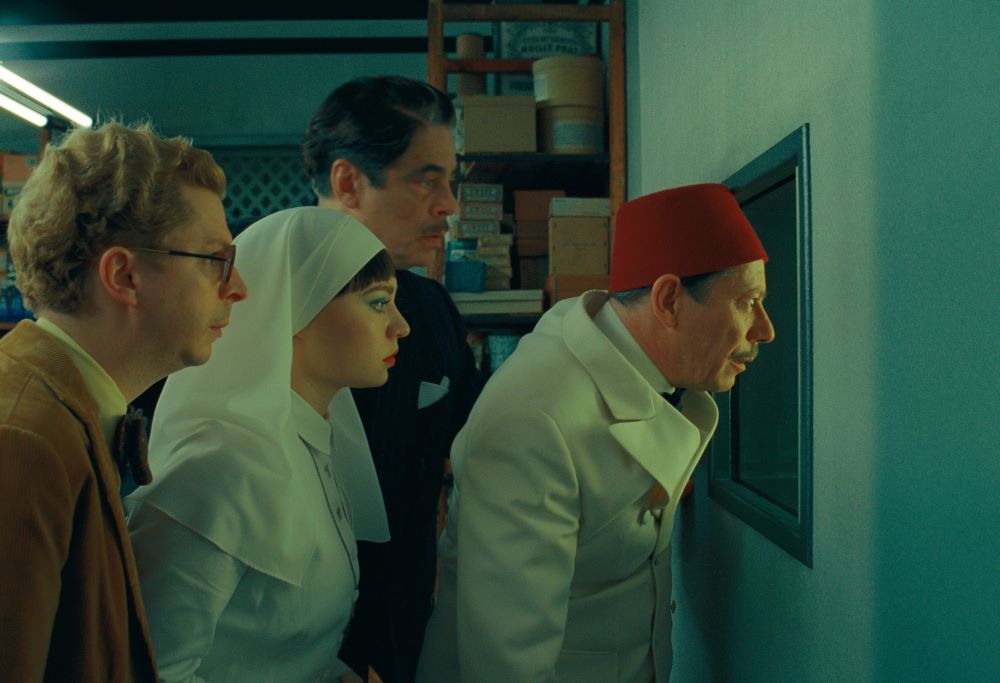In The Phoenician Scheme, Wes Anderson trades the sprawling theatricality of The French Dispatch (2021) for something a little quieter, a little more intimate, though no less visually dazzling. Yes, all the signature elements are there: ornate sets, pastel hues, whip-smart deadpan dialogue, and perfectly blocked tracking shots. But beneath the lacquered surface lies a surprisingly raw and emotionally resonant story, one centred not on spectacle, but on the slow and often awkward process of redemption.
The film follows Anatole “Zsa-Zsa” Korda (Benicio del Toro), a morally questionable tycoon in the twilight of his career, who names his estranged daughter, Liesl (Mia Threapleton), a devout young nun, as his unexpected successor. What unfolds is a story that mirrors The Grand Budapest Hotel in tone and aesthetic, but narrows its lens onto a father trying to both reconcile with his past and rewrite his legacy. Unlike many of Anderson’s films, this one gives its central character the opportunity to change — and to do so meaningfully.

Korda knows he’s slippery. He’s made peace with the fact that he’s cut corners, betrayed friends, and played dirty to climb the ladder. But it’s Liesl’s presence — principled, unimpressed, and refreshingly honest — that forces him to question what’s left when power fades. Their relationship forms the emotional spine of the film, grounding the quirk and chaos with something resembling genuine vulnerability. And in a rare move for Anderson, that vulnerability is allowed to bloom.
One of the film’s best surprises is Brampton’s own Michael Cera as Björn Lund, a soft-spoken, bug-obsessed tutor with a wavering Norwegian accent. More than just comic relief, he’s the emotional glue between Korda and Liesl, bridging their ideological divide with deadpan humour and quiet sincerity. His presence adds warmth and balance to the trio’s dynamic, rounding out what could’ve been a more rigid story.
As always, the cast is stacked, and The Phoenician Scheme might feature the most delightful cavalcade of cameos in a Wes Anderson film to date. From blink-and-you’ll-miss-it appearances to fully committed supporting roles, Anderson once again proves he has the Rolodex (and loyalty) to assemble a dream ensemble.
Another distinctive layer in the film is the sharp (and deeply funny) portrayal of Korda’s network of business partners — mostly men, mostly incompetent. Their dealings play out less like high-stakes boardroom drama and more like a boyhood playground: slap fights, absurd competitions, and ego-fueled stunts decide serious outcomes. It’s a clear bit of satire, a not-so-subtle jab at how the so-called titans of industry are often just overgrown children. Their antics add levity but also highlight the emotional maturity in the film’s central duo, casting their quieter, more honest dynamic in an even warmer light.
That contrast becomes one of the film’s greatest strengths. While the boys play pretend, the father and daughter wrestle with real questions: morality, legacy, faith, forgiveness. Despite their polar differences — a con man and a would-be nun — they offer one another more grace and understanding than any of the so-called professionals flailing in their orbit. It’s that push-pull, the honest discomfort of it, that gives The Phoenician Scheme its emotional weight.
Del Toro turns in one of his most nuanced performances in years, oscillating between charisma and deep regret. But it’s Mia Threapleton who steals the show, sharp-eyed, unshakable, and quietly magnetic. She’s less impressed by her father’s theatrics than she is invested in whether he can actually change. And with Cera rounding out the emotional triangle, the film achieves a balance of tension and tenderness that feels both classic Anderson and entirely new.
Premiering at Cannes to a mix of applause and confused murmurs, the film has split critics — some arguing that Anderson leans too hard on familiar stylistic crutches, others applauding his thematic depth. But whether you find it disjointed or disarming, there’s no denying that The Phoenician Scheme is Wes Anderson at his most self-aware, and, maybe, at his most hopeful.
Verdict: Come for the eye candy and impeccable casting. Stay for the strange, warm, and surprisingly human story of a father and daughter slowly learning to understand each other — not through grand gestures, but by unpacking old wounds, challenging each other’s worldviews, and ultimately finding a middle ground that redefines what morality, love, and legacy mean for them both.
***
The Phoenician Scheme opens May 30, 2025. It premiered at Cannes on May 18, 2025.



